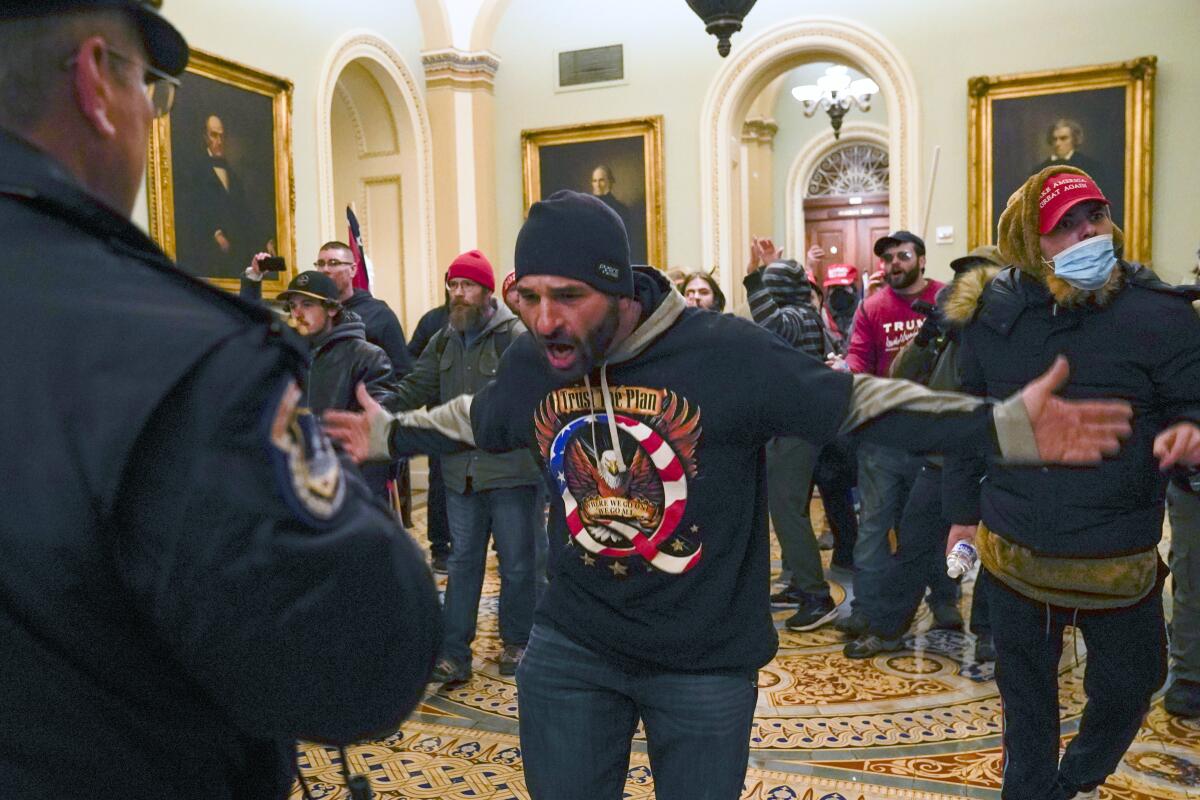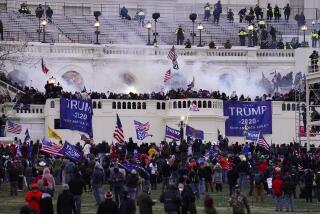Who’s been charged in the deadly Capitol riot?

- Share via
Prosecutors have brought dozens of cases after the deadly attack at the U.S. Capitol, and more charges are expected in the coming days as investigators identify more members of the pro-Trump mob.
Investigators are collecting tips from the public, interviewing witnesses and going through photos, videos and social media accounts to collect evidence against the attackers who overran the Capitol to stop the certification of Democrat Joe Biden as the next president. And those who’ve been charged so far could lead investigators to others who joined in the violent siege on Capitol Hill.
Some questions and answers about the investigation into the Capitol breach:
How many people have been charged?
The U.S. attorney for the District of Columbia has brought federal charges against about 20 people so far, while 40 others have been charged in D.C.’s Superior Court. The people charged in Superior Court are mainly accused of curfew violations and gun crimes. Those being tried in federal court, where prosecutors can generally secure longer sentences, are charged with offenses such as violent entry and disorderly conduct on Capitol grounds, assaulting a federal law enforcement officer and threatening House Speaker Nancy Pelosi (D-San Francisco).
On Tuesday, federal agents arrested the son of a New York City judge, who was seen inside the Capitol wearing a fur costume and a police vest authorities say he stole during the mayhem. Images posted on social media showed agents appearing to remove part of Aaron Mostofsky’s fur getup from the Brooklyn home where he was arrested. He faces charges that include theft of government property.
Federal authorities on Sunday arrested two men who were photographed with plastic restraints inside the Capitol. Investigators said they used social media and livestream videos to identify Eric Munchel of Tennessee as the masked person seen in photos carrying plastic hand restraints in the Senate chamber.
Retired Lt. Col. Larry Rendall Brock Jr. of Texas was photographed on the Senate floor carrying zip-tie handcuffs and wearing a military-style helmet and vest, authorities said. Brock’s ex-wife helped authorities identify him, according to court documents. He confirmed to the New Yorker that he was the man in the photographs and claimed he found the zip-tie handcuffs on the floor. “I wish I had not picked those up,” he said.
Why haven’t more people been charged?
Authorities are working to identify more suspects, and more charges are expected.
Many people were allowed to leave the Capitol freely on the day of the attack, so investigators have to sort through a sea of photos, video, social media posts and tips from the public to see who was there and track them down.
Federal prosecutors across the U.S. have also said people could face charges in their home states if they traveled to Washington and took part in the assault.
Massachusetts’ top federal prosecutors said Monday that their office has received “lots of tips” and has investigations underway. But for prosecutors outside Washington to bring a case, they would need evidence that someone traveled there with plans to participate in the destruction and violence, said U.S. Atty. Andrew Lelling.
“Much of what happened in the District looked like — at least for most of the participants — it was pretty spontaneous,” Lelling said in an interview. “So in many respects, we may be looking for something that just doesn’t exist. But we will look.”
Could they face more serious charges?
Prosecutors can tack on more serious charges as they gather more evidence. Michael Sherwin, acting U.S. attorney for the District of Columbia, has said authorities are not keeping anything out of their “ arsenal for potential charges.”
The FBI has also opened a murder probe into the death of Capitol Police Officer Brian D. Sicknick, who was hit in the head with a fire extinguisher, according to law enforcement officials who spoke on the condition of anonymity because they were not authorized to discuss the investigation publicly.
Experts say federal prosecutors could bring rarely used seditious conspiracy charges, which call for up to 20 years in prison, against some of the attackers.
After protests across the U.S. over police brutality in the summer, then-Deputy Atty. Gen. Jeffrey Rosen told prosecutors in September that they should consider using the sedition charge against violent demonstrators. Rosen, who took over the top Justice Department job when Atty. Gen. William Barr stepped down last month, said the charge does not require proof of a plot to overthrow the U.S. government and gave the hypothetical example of a group that “has conspired to take a federal courthouse or other federal property by force.”
Could Trump be charged?
Trump urged the crowd to march on the Capitol, even promising to go with them, though he didn’t. The president told his supporters to “fight” to stop the “steal” of the election, while his personal lawyer, Rudolph W. Giuliani, called for “trial by combat.”
The legal bar for charging the president or any other speakers at the rally with inciting violence is high. Experts say it might be tough to prove in a normal prosecution that the president intended for violence to happen on Capitol Hill.
However, Trump faces a charge of “incitement of insurrection” in an impeachment resolution to be debated by the House on Wednesday as part of an extraordinary effort to remove Trump in the final days of his presidency.
Could any officers face charges?
At least two Capitol Police officers, one who took a selfie with the attackers and another who put on a Make America Great Again hat, have been suspended. At least a dozen more are under internal investigation for their behavior during the uprising, according to lawmakers.
The Capitol officer who shot Ashli Babbitt, a Trump supporter who was trying to climb through a broken window into the speaker’s lobby, has been placed on administrative leave per agency policy, and the shooting is under investigation by Capitol Police and the Metropolitan Police Department.
More to Read
Get the L.A. Times Politics newsletter
Deeply reported insights into legislation, politics and policy from Sacramento, Washington and beyond. In your inbox twice per week.
You may occasionally receive promotional content from the Los Angeles Times.










